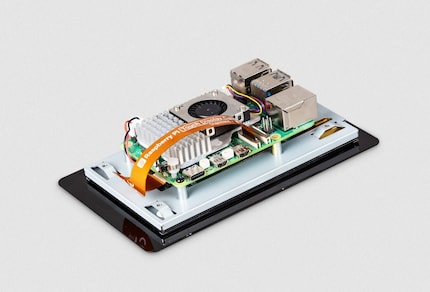
Official Raspberry Pi Touch Display 2 in 5-inch format presented
The new official Raspberry Pi Touch Display 2 with 5 inch provides HD resolution, seamless system integration and can be mounted directly on the Raspberry Pi 5 and older models.
With the new 5-inch Touch Display 2 the Raspberry Pi Foundation is expanding its touchscreen portfolio with a compact variant that is ideal for space-critical projects. An IPS panel with 24-bit RGB colours and LED backlighting is used. This should ensure clear colours, a sufficient viewing angle and even illumination.
Despite the reduced diagonal, the display offers the same resolution of 1280 × 720 pixels as the 7-inch model and achieves a sharper display thanks to a higher pixel density (294 ppi instead of 210 ppi). Only the viewing angle is somewhat narrower at 80 degrees (instead of 85), which can lead to colour shifts when viewed from the side.
Setup and integration
As usual, the panel connects to the Raspberry Pi via the native DSI port. Power is supplied directly via the GPIO pins, allowing the display to be mounted on the Pi 5 or on compute modules such as CM4 and CM5 with the corresponding IO board to save space. Under Raspberry Pi OS, the touchscreen is recognised immediately, eliminating the need for manual calibration or driver installation. According to initial field reports, the official 5-volt power supply is sufficient to supply the display with a stable power supply, even with additional USB peripherals.

Source: Raspberry Pi Foundation
In contrast to many third-party solutions, the official 5-inch version impresses with seamless system integration and increased reliability. While other panels sometimes require software customisations or separate power connections, the Raspberry Pi Touch Display 2 runs immediately with Raspberry Pi OS Bookworm and newer versions. The included ribbon cables and ZIF connectors require a little dexterity when plugging them in, but ensure a compact setup without further cable clutter.
Projects and applications
With its compact format and high pixel density, the 5-inch Touch Display 2 is particularly suitable for space-critical embedded projects, control panels or portable interfaces. Initial developer reports indicate that the panel can be easily integrated into existing Raspberry Pi setups - for visualisations, device control or simple graphical user interfaces, for example.
However, the Touch Display 2 is less suitable for use as a primary desktop interface - the touch operation is sufficient for simple inputs, but not for full control of the operating system. The use of a mouse and keyboard is still recommended, especially for more complex applications or navigation through classic desktop menus.
We are endeavouring to make the new touch display available in our shop as soon as possible. The official price is 40 US dollars (excl. VAT). The Raspberry Pi Foundation guarantees availability until at least 2030, which also makes the new panel attractive for industrial applications and commercial orders. The Touch Display 2 is compatible with all Raspberry Pi models that have a DSI connector - i.e. from model 1B+ upwards (except the Zero series).
I find my muse in everything. When I don’t, I draw inspiration from daydreaming. After all, if you dream, you don’t sleep through life.
From the latest iPhone to the return of 80s fashion. The editorial team will help you make sense of it all.
Show all